Top 6 Commercial Flooring Options
In the world of commercial construction, the options for commercial flooring seem endless and include Epoxy Flooring, Polyurea, Quarry Tile, Carpet Tile, Vinyl Composition Tile, and Polished or Stained Concrete. With so many alternatives, the question is often asked, which commercial flooring option is the best?
Let’s start by examining all the different commercial flooring or industrial-grade floor systems available and the benefits each possess.
1) POLYUREA FLOORING
Polyurea is a flexible, synthetic material used for truck bed liners, interior pipe coating, tunnel coatings, tank lining, commercial roofing, and commercial flooring applications. Virtually impenetrable, Polyurea is also flexible with an elongation rate that exceeds 300%, far beyond that of epoxy.
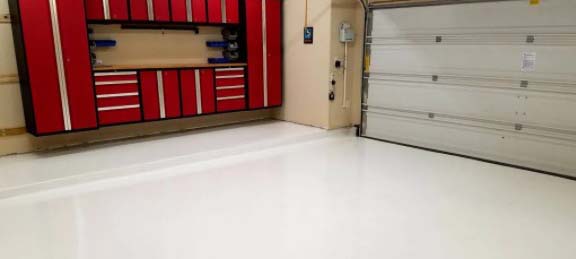 Virtually maintenance-free, Polyurea is far more durable than the best epoxy material, plus it is impact-resistant, chemical-resistant, heat-resistant, sunlight-resistant, and microbial-resistant, making it an excellent flooring product for wet areas, commercial kitchens, and hospitals.
Virtually maintenance-free, Polyurea is far more durable than the best epoxy material, plus it is impact-resistant, chemical-resistant, heat-resistant, sunlight-resistant, and microbial-resistant, making it an excellent flooring product for wet areas, commercial kitchens, and hospitals.
The single-day application process can be sprayed on or applied in pre-made rolls, are ready to return to service within 24 hours, and are designed to last for over 15 years, with some products offering a 20-year warranty. In addition, Polyurea has a high heat tolerance and is UV resistant, meaning it won’t fade in sunlight.
Pros: Long Lasting, Slip Resistant, Chemical Resistant, Oil Resistant, Impact Resistant, Microbial Resistant
Cons: None
2) POLISHED or STAINED CONCRETE
Polished Concrete floors are achieved by grinding the existing concrete with heavy-duty machines equipped with progressively finer grits of sanding disks until the desired shine and smoothness are achieved. This process is similar to sanding a piece of wood. The goal is to remove any blemishes, minor pits, or stains from the floor.
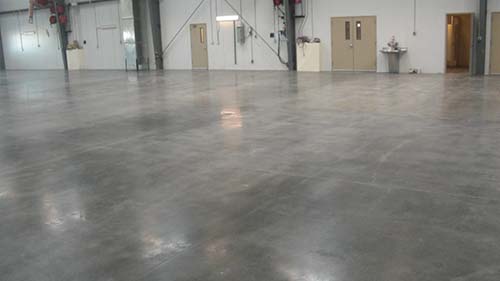 If Stained Concrete is the look desired, the final step is to add stains, dyes, or decorative patterns that often create a beautiful aesthetic look. Since concrete is porous, concrete staining penetrates below the surface and gives your floor a permanent look. Unfortunately, staining doesn’t cover floor flaws such as blemishes, cracks, or discolored areas.
If Stained Concrete is the look desired, the final step is to add stains, dyes, or decorative patterns that often create a beautiful aesthetic look. Since concrete is porous, concrete staining penetrates below the surface and gives your floor a permanent look. Unfortunately, staining doesn’t cover floor flaws such as blemishes, cracks, or discolored areas.
Although the process of Polished or Stained Concrete Flooring takes time and the outcome can be beautiful, polishing and staining concrete doesn’t increase the strength or durability of the concrete
Pros: Durable, Economical, Many Design Options,
Cons: Slippery When Wet, Visually Inconsistent
3) EPOXY FLOORING
Not to be confused with garage floor paint, Epoxy Flooring is best suited for industrial use like garage floors or outdoor surfaces. Epoxy floor resin is a 2 part system that combines polymer resins and hardeners that bond with each other and the floor, creating a hard plastic material that is durable, resistant to damage, won’t crack or peel, and will typically last between 5 and 10 years.
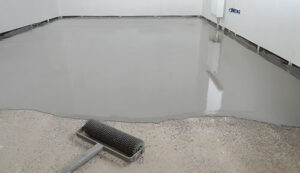
Some of the limitations to epoxy flooring include the long cure times as they can take up to five days to cure fully, and since they are non-porous, epoxy floors are slippery when wet, making it a poor candidate for wet areas. Another negative is that during the application, the epoxy chemical mixture gives off a potent, unpleasant chemical smell, making it necessary for crews will wear safety masks and goggles when applying; however, once cured, the smell disappears.
Pros: Impact Resistant, Water Proof
Cons: Slippery When Wet, Color Fading Or Yellowing, Long Cure Times, Chemical Curing Odor
4) QUARRY TILE
Quarry Tile is a clay-based ceramic tile fired at extremely high temperatures (~2,000 F) that makes the final product dense, nonporous, and naturally water-resistant.
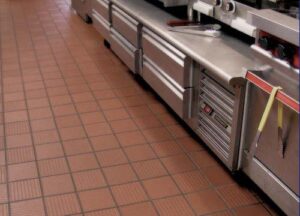
Although it can be installed on walls, Quarry Tile is most often used as a commercial floor tile for both indoor and outdoor applications since Quarry Tiles possess low water absorption rates. Because they are naturally water resistant, Quarry Tile does not need to be sealed and is a good option for wet areas such as kitchens and baths.
Although it offers little design versatility, Quarry Tile is a durable building material, usually 1⁄2 to 3⁄4 inch thick, commonly used in commercial kitchens, breweries, dairies, and other heavy-use, high-traffic commercial spaces.
Pros: Durable, Water Resistant, High Impact Resistant, Slip Resistant, Cleanable, Long Lasting
Cons: Limited Design Options
5) CARPET TILE
Carpet Tile, aka modular carpets or square carpets, are squares cut from wall-to-wall rolls that can be pieced together to cover a room. As a versatile wall-to-wall carpet alternative, Carpet Tiles are glued to the floor with some tiles manufactured with a glue-back, known as a seal and stick system; others will need carpet tile glue to adhere to the subfloor.
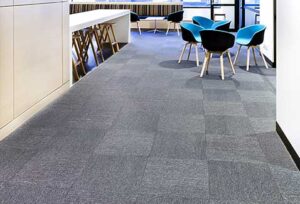 Easy to install, Carpet Tiles are manufactured with an attached underlay, so it is unnecessary to apply additional underlayments. The good news is carpet tiles are also easy to remove and replace, which is beneficial since they wear like carpet and are not waterproof, although some can be water resistant to a degree.
Easy to install, Carpet Tiles are manufactured with an attached underlay, so it is unnecessary to apply additional underlayments. The good news is carpet tiles are also easy to remove and replace, which is beneficial since they wear like carpet and are not waterproof, although some can be water resistant to a degree.
Carpet Tile offers many design options, including shapes such as hexagons, triangles, and the traditional square option.
Pros: Many Design Options, Easy Installation, Replaceable
Cons: Limited Durability, Not Waterproof
6) Vinyl Composition Tile (VCT)
Vinyl Composition Tile (VCT) is a durable commercial flooring material that is affordable and easy to install. VCT is available in many colors and patterns and is a low-maintenance option that can imitate wood, stone, and ceramic tile.
Although VCT is a versatile commercial flooring option, it does require periodic maintenance to maintain its appearance, protective finish, and performance. However, appropriately maintained VCT can keep its luster and avoid staining and damage.
Static Control
VCT can be engineered to have antistatic properties, making it a good option for corporate office environments, like computer server rooms, where controlling static electricity is critical.
Pros: Affordable, Easy To Install, Many Design Options
Cons: Maintenance Required
OUR CONCLUSION
After spending years in the commercial construction business and using all the different flooring choices available, the current most popular choice is Epoxy Flooring, however the most durable, long-lasting, impact and chemically resistant option on the market is Polyurea Flooring, and the most dependable option of Polyurea Flooring is a roll on product called Right-On FiberFlex.
Need an expert opinion about which commercial flooring option is best for your company? Contact a commercial flooring specialist at Omega Contracting and Consulting today.
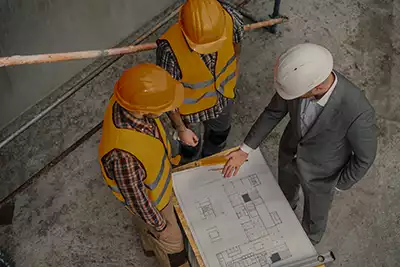
Contact Us Today!

